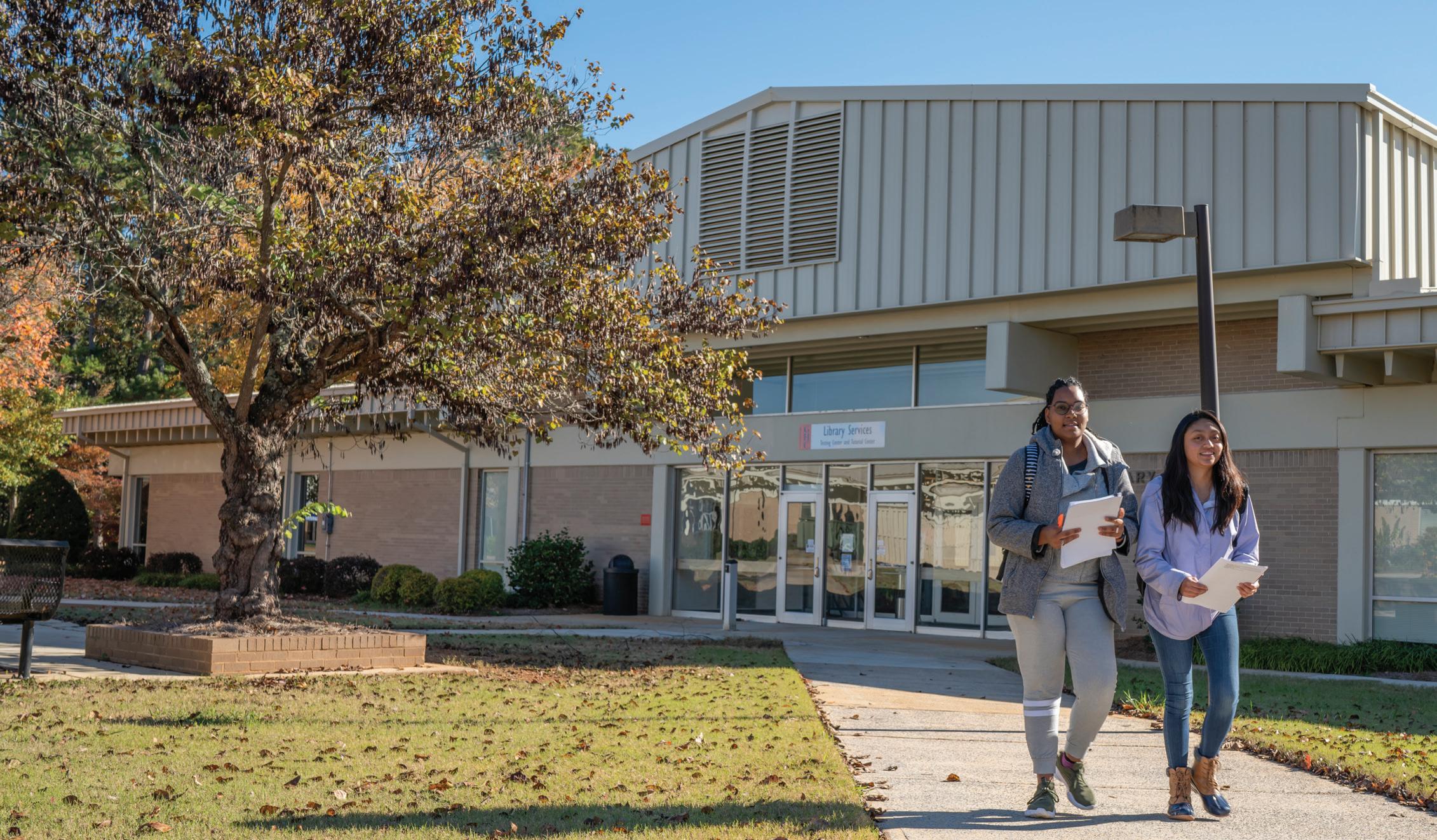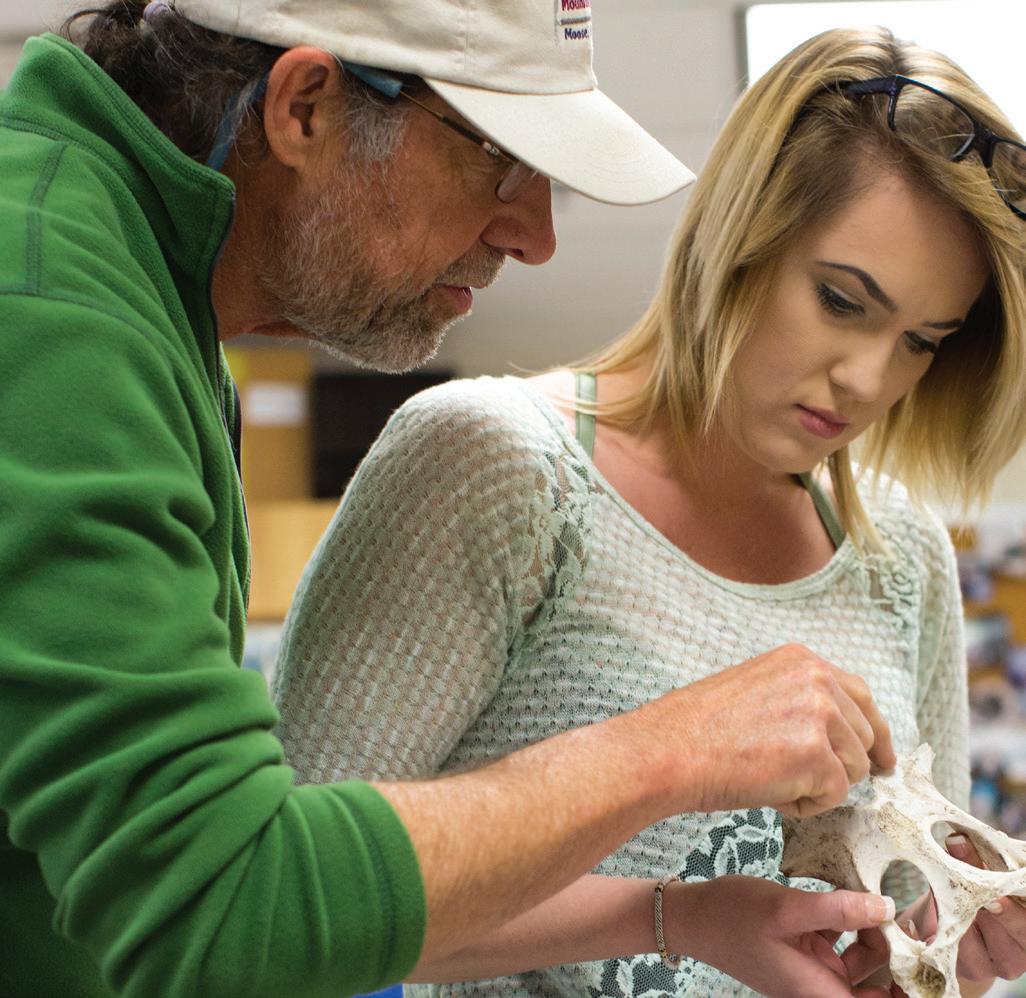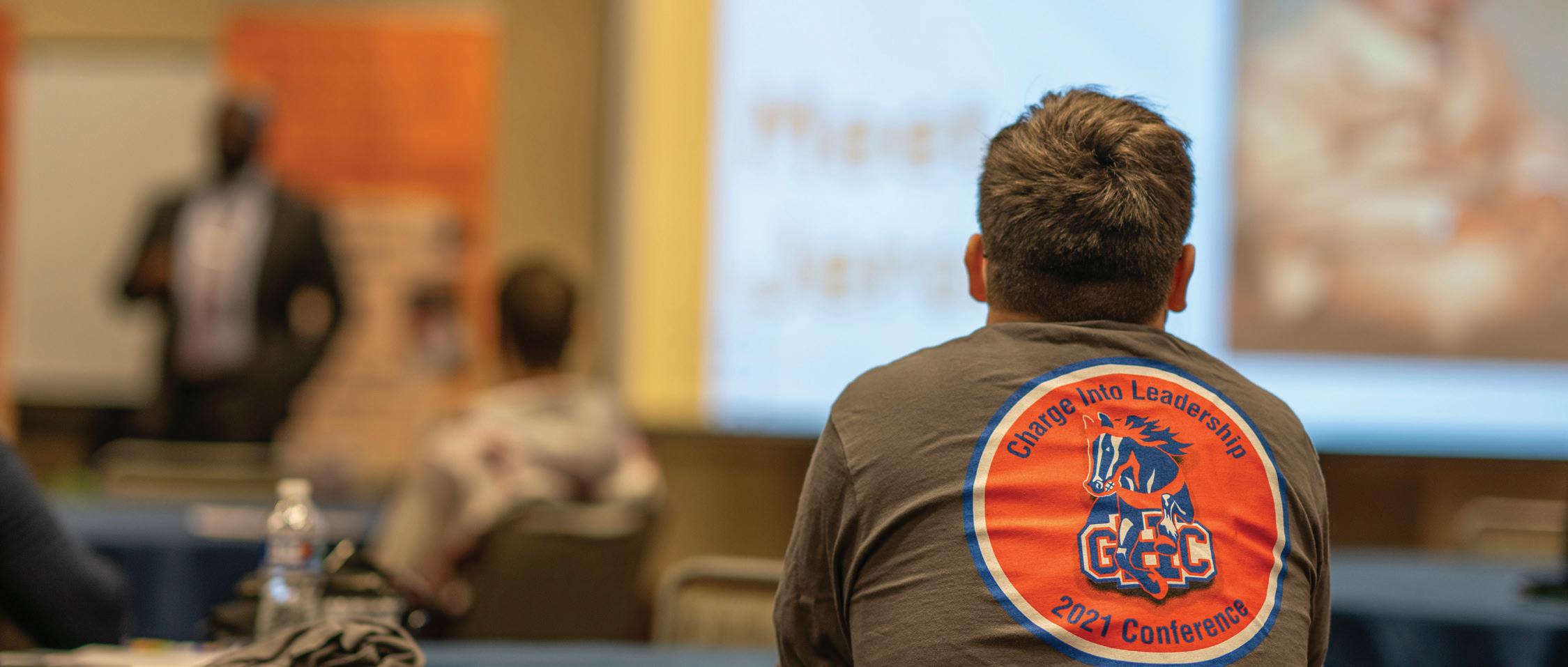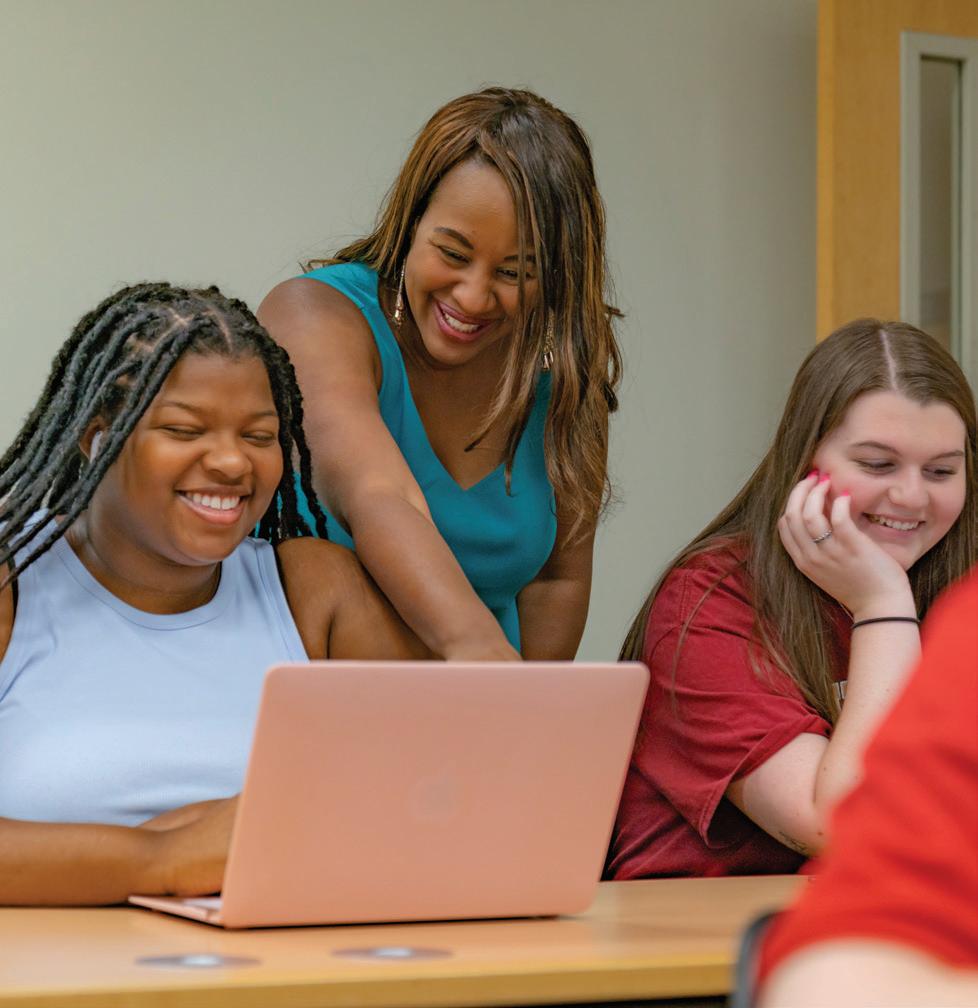
18 minute read
Our Shared Values
In 2021, Georgia Highlands College launched a new strategic plan. The process for developing a new strategic plan started in 2018. Through a process led by the Strategic Planning Council at GHC, two important questions were asked: Who are we now? Where do we go next?
Backed by data and information from surveys, focus groups, workshops, and forums, the strategic priorities for GHC starting in 2021 and going through 2026 are access and opportunity, inclusivity and engagement, student success, and efficiency and effectiveness.
These priorities were aligned with GHC’s mission and with the college’s five “shared values” around that mission. Those values are access, caring, inclusivity, engagement, and excellence.
In the following special section, read more about how Georgia Highlands College is working increase the college’s continued efforts of these shared values and strategic priorities.
ACCESS We provide access to high quality, affordable educational opportunities within the diverse commu nities we serve. Through intellectual, cultural, physical, and social developmental opportunities, we facilitate the growth and wellness of our students, employees, and our communities. College expands access to meet needs of student population
As Georgia Highlands College works to meet the growing needs of a highly mobile student population, providing greater access to resources is paramount to academic success. The Division of Enrollment Management and the GHC Library System are two areas where the college has expanded access to students.
Enrollment Management
Through GHC’s Division of Enrollment Management, students can gain access to more information and resources than ever before thanks to orchestrated efforts across the division which includes Admissions and Advising.
To help students learn about the resources they have available from the moment they begin at GHC, Enrollment Management has worked to reorganize the orientation process.
“At GHC, orientation is not a one-time event,” Executive Director of Enrollment Management Jennifer Hicks said. “In an effort to engage students from the time of acceptance through to the first day of class, the Enrollment Management team, along with other orientation stakeholders, has invested in a multi-step approach to transitioning our students to college.”
Upon acceptance, students complete a self-paced, pre-orientation module to learn about GHC and how to be successful. They also complete an in-take survey that advisors use to build a customized class schedule for each student.
Once pre-orientation is complete, students sign up and attend a virtual orientation. This event is held virtually so all student types can access the opportunity to connect with GHC faculty and staff at a time that is convenient for them. The final major step in the process is our Welcome to Campus Orientation.
“These events are held the week before classes begin at each site and offer students the opportunity to meet with faculty from each school, participate in various breakout sessions that interest them – how to be successful in the classroom, getting involved on campus, paying for college, etc. – and take a campus tour,” Hicks said.
The Welcome to Campus Orientation is designed to help students really feel like they are a GHC Charger and to get them excited about the upcoming semester. Between these activities and events, staff in the Enrollment Management Division are also sending various communication campaigns to our new students to help them take care of any outstanding requirements
and answer any remaining questions.
To ensure students easily access assistance in Advising, Admissions, Student Support Services and more, GHC launched the Virtual HUB. Since its inception in the 2020 fall semester, the Virtual HUB has grown from serving 660 students in its first month to now serving more than 2,800 students at GHC.
Accessible from any device as well as through on-site modules, the Virtual HUB provides students with essential services in a more convenient virtual environment. Students can go to virtualservices.highlands.edu to connect, click the “Virtual HUB” logo on various pages at highlands. edu to connect, or they can scan the QR Code with their smart phone or tablet from any campus poster advertising the HUB to get started.
“The convenience of clicking a link and almost instantly being connected to a live person on the other end who can help navigate various college processes is a game changer for many of our students,” Hicks said.
Behind the scenes, Enrollment Management has expanded how students access guidance in their academic career by working with each of GHC’s five Schools to provide faculty advisors with training on how to advise students on programs of study. Through implementation of the Quest for Success advising model and by partnering with faculty pathway experts, Advising has created specific trainings to ensure we are providing students with the most up to date information about their academic pathway.
In addition, Advising is working toward maintaining engagement with students beyond required appointments. This includes the implementation and redesign of the Early Alert system that helps students get quicker and more targeted alerts when veering off track.
“The Early Alert system helps students to make informed decisions regarding their academic progress, and we work closely with the Tutorial Center to get more students to take advantage of tutoring services when a tutoring alert is raised,” Hicks said. “In addition, we analyze year-one data to determine which population of students needs more extensive outreach.”
Libraries
The library system has been integral in expanding online education through GHC, largely in part to ensuring students have the knowledge they need to access its plethora of resources.
For GHC students, learning how to access and use the library’s resources is easy thanks to a series of videos explaining how to conduct research through GALILEO, LibGuides, databases, and physical collections.
Assistant Professor of Library and Information Science and Campus Librarian Jessica Osborne said while many recognize the library as the go-to location for books, it is also a point of access for student success.
“We provide study rooms, computers for in-branch use and check out, study help during critical times in the semester, countless digital resources, in-person support for research, academic advising, and essential workshops on everything from using Microsoft Word to Zotero,” Osborne said. “We frequently offer library workshops, but we also partner with other offices on campus to bring informative and fun, educational workshops/ programs to our space.”
To help students gain deeper knowledge on how to access and utilize its resources, the library has begun offering full, for-credit courses.
The libraries also provide access to thousands of physical books as well as e-books, magazines, and streaming media through partners like OverDrive, Kanopy, and Flipster.
05
and Forward
CARING We demonstrate personal and professional caring for all students and employees. Through our shared values, we seek to ensure that students and employees know that we are invested in their well-being, growth, and success.
Thank-A-Teacher Program allows students to recognize faculty
Since 2020, the Thank-A-Teacher Certificate Program at GHC has given students an opportunity to express their gratitude toward faculty members who exemplify the college’s shared value of caring by going above and beyond to help students along their journey.
Every semester students are afforded the opportunity to acknowledge their professors by sharing details about how they have made a difference during that semester. Instructors then receive a Thank-A-Teacher certificate honoring their contributions.
The certificates featuring the students’ “thank you” and signed by the Provost and Director of the Center for Excellence in Teaching and Learning (CETL) are provided to instructors at the end of each semester after submitting final grades.
“The program shows instructors that they are making a difference and that their students recognize and appreciate their efforts,” Director for the CETL Josie Baudier said. “This program is a great morale booster, especially after the Spring 2020 semester when all courses shifted to remote instruction.”
Baudier said the response to the program has been positive from both students and faculty. .
“Instructors sincerely appreciate the personalized notes which recognize and thank them for their efforts,” CETL Instructional Designer Rachel Rupprecht said. “They are often surprised to hear what a difference they have made with students and encouraged that their efforts have not been in vain.”
In fall 2021, a student who wished to remain anonymous, wrote a nomination letter which resulted in a certificate being awarded to the entire GHC community.
“I would like to say ‘Thank You’ to the entire GHC staff for the personal dedication each one of you provided to ensure I was successful in each semester. I always ran away from school, always felt I was not ‘school material,’ afraid I would fail,” the student wrote. “Each of you helped me face a fear that has haunted me for 40 years. Because of you, GHC, I am finally free from that fear. No longer beating myself up about past mistakes or failures. I used to get straight Fs in school and was forced to drop out because of a low GPA. Because of the awesome staff at GHC, I am now getting As and Bs, and in classes I would have normally received Fs in. Each of you should be proud of the work you are doing and success you are instilling in students.”
The Thank-a-Teacher Certificate Program exemplifies how many of GHC’s instructors are carrying out the college’s mission of providing access to high quality, affordable educational opportunities for students who might otherwise not have the opportunity to pursue higher education. More than 500 certificates have been issued since the program’s inception.
“Our instructors work in and through challenging circumstances and are to be commended for their outstanding efforts,” Baudier said

Thank-A-Teacher examples:
“The comments blessed my heart. It is greatly encouraging and rewarding to know that I am making an impact in the lives of students.”
“This is some much-needed encouragement after a very stressful year.”
“These are heartwarming and truly brighten the spirit.”
“This is very encouraging for me!”
“Thanks so much for the award. This made my day!”
“It’s always a good feeling to know that some students are willing to take the time to ‘Thank a Teacher’!”
“Thank you SO much for sharing this with me!! I can’t adequately express how deeply grateful I am.”
“This was completely unexpected.”
“What a wonderful surprise! Thank you!”
“I put a great deal of effort into beefing up my online classes over the summer of 2020 because of the COVID-19 pandemic. I think that it really paid off for students during the 2020-2021 academic year. Thanks for helping confirm that for me.”
“Thank you for forwarding these comments to me. They were reaffirming after a very difficult semester.”
We foster engagement for and between students, employees, alumni, and our communities. We encourage positive, meaningful interactions and relationships between individuals, groups, and organizations which lead to intellectual, cultural, physical, and social development.
Student engagement essential to student success
Keeping students engaged inside and outside the classroom is crucial to GHC’s shared value of engagement.
CURE and Experiential Learning Opportunities

Inside the classroom, the college offers what are known as “Course-Based Undergraduate Research Experiences” (CURE), in which students are given certain parameters and are then allowed to develop, implement, and complete their own research on a topic they choose. For example, the School of STEM (Science, Technology, Engineering and Mathematics) has partnered with The Margaret and Luke Pettit Preserve which allows for field-based undergraduate research of wildlife, plants, and ecosystems within GHC’s biology courses.
Biology Instructor Ericka Walczak is currently running a CURE in her Principals of Biology class.
“This semester my guided research project was having the students look for bacteria in the soil that produce antibiotics,” Walczak said. “Students learn about soil and microbial life then obtain a soil sample from a location of their choice.”
After obtaining a soil sample, students then serial dilute and characterize the bacteria found in their sample. Next, they perform a “boxing match” between the safe relative of known hospital pathogens and their isolates – bacteria colonies – from the soil.
If an antibiotic is produced by the soil isolates, the known hospital pathogen cannot grow next to the isolate, and it creates a zone of inhibition. This result varies from student to student based on the bacteria isolated from the soil.
All the laboratories up to this point in the class are guided and about learning the proper techniques as well as base content.
“From here the students are asked to consider the growth requirements of bacteria and how they are cultured in the laboratory and create an experiment in which they could maximize the growth of their bacteria or by manipulating bacterial growth obtain antibiotic production that was missed originally,” Walczak said. “For example, this semester I had students who grew plates outside to subject the bacteria to temperature fluctuation, I had students increase the humidity in which the isolates grew, and students grew the isolates at varying temperatures.”
Students in other courses within the School of STEM have partnered with Allatoona Lake to complete an analysis on the amount of dissolved oxygen, conductivity and pH of the water as well levels of coliform bacteria.
Experiential learning opportunities include the School of Business and Professional Studies’ Charger Innovation Challenge (CIC) in which students create and present their idea for an invention in a competition format similar to popular TV show “Shark Tank.”
In addition, GHC’s School of Business and Professional Studies offers its Entrepreneur Speaker Series each semester, providing students with the opportunity to learn from successful entrepreneurs in a convenient, virtual format.
Both the CIC and Entrepreneur Speaker Series – while tied to specific programs of study – are open to students from all majors.
Beyond Academics
In addition to offering drive-in movie nights, student organization meet-and-greets and, of course, food and fun, GHC’s Department of Student Engagement has worked to promote and provide engaging opportunities for students that expound upon academics and selfdevelopment.
The department held the Charge Into Leadership Conference in October which featured motivational speaker and leadership expert Quentin Lee of Childersburg High School. Also featured were breakout sessions from faculty on growing and applying leadership skills, a speaker panel from outside entrepreneurs, and a Women in Leadership roundtable.
Other opportunities from the department include field trips to historic sites as well as guest speakers such as former childhood actress and current mental health advocate Lisa Jakob from “Mrs. Doubtfire” and “Independence Day” fame. Personal growth opportunities such as yoga and American Sign Language basics are also offered.
Our Shared Values
EXCELLENCE
We champion excellence for and by each student, employee, and our communities. Through intellectual, cultural, physical, and social development, we strive to perform and achieve at the highest levels possible in all that we do by operating with the highest standards of academic achievement, personal ethics, and organizational stewardship.
Teaching and Learning center targets excellence through education and course design
The Center for Excellence in Teaching and Learning (CETL) supports the shared value of excellence by providing research-based faculty development courses focused on pedagogy and practical teaching strategies.
“The CETL staff models excellent teaching practices while offering development on these research-based topics. We strive to let the research guide our work,” CETL Director Josie Baudier said. “In these faculty development courses, we ask our participants to put the content into action, allowing us the opportunity to provide feedback on their deliverables. Feedback is key to mastery of the content.”
Some initiatives from the CETL which exemplify excellence include professional development and faculty workshops on a myriad of topics such as course design, engaging lectures, media usage, and copyright law, USG initiates, and more.
Professional Development
The CETL’s multi-week workshop courses explore the research and practices of different teaching and staff needs and provides a space for faculty and staff to practice the skills in the workshop. These workshops are delivered using D2L, the environment in which GHC’s online courses are taught. In addition, these multi-week workshop courses model best practices for online design and delivery.
“The CETL Labs facilitate asynchronous hands-on engagement with pedagogical professional development over a four-day period,” Baudier said. “Participants in labs are expected to work independently on the deliverable(s) that can be put into action in the classroom quickly.”
The CETL also organizes Faculty Learning Communities (FLC) as a way to gather faculty and/or staff together focused on one topic. These FLCs provide a space for participants to reflect on their own practice and how to make improvements. The FLC provides dedicated time to share their practices with their colleagues and learn from their peers.
Topics for this year’s FLCs included a focus on part-time faculty, book discussions, and best teaching practices. Additionally, the STEM IV Initiative Grant sponsors an FLC on High Impact Practices which CETL staff support.
24 | Spring/Summer 2022

Course Design
The CETL offers workshops and online resources on course design. The methodology of alignment and course design is embedded in most workshops because they are foundational to effective teaching and student success.
Funds from the Higher Education Emergency Relief Fund (HEERF) have provided for faculty to take part in Quality Matters (QM) Online Course Reviews.
Quality Matters is a nationally recognized program that provides a process and rubric for measuring the effectiveness and efficiency of online course design. These online courses have been reviewed by a team of three reviewers external to GHC. The rubric used in the reviews is built on research-based practice for online course design.
By using QM Rubrics and Standards, this review process will give national recognition for those courses that have successfully completed the course review.
“Although this process can be extremely time-consuming and stressful for the faculty, yet it is very beneficial to creating excellent online courses for students,” Baudier said.
Currently there are more than three dozen courses undergoing review.
The GHC faculty involved in this project have contributed a large amount of time and effort. They are Allen Dutch, Althea Moser, Amanda McFarland, Donna Catapona, Jay Pickern, Jayme Wheeler, Jessica Lindberg, Jamie Howard, Kamisha DeCoudreaux, Kim Robers, Lisa Jellum, Lucinda Montgomery, Michelle Boyce, Oris Guillaume, Sandi Anderson, Sean Callahan, Tera Phillips, and Tom Harnden.
INCLUSIVITY
We recognize the contributions of individuals with diverse backgrounds and talents and work toward inclusivity by creating a culture where diverse perspectives are authentically acknowledged and where those perspectives influence decision-making.
Student organizations promote inclusivity
GHC is home to Registered Student Organizations (RSO) based on shared activities and interests like gaming and photography. The college also hosts organizations like Brother 2 Brother (B2B) and Woman 2 Woman, which provide members of the college’s diverse student population a sense of community and inclusivity as well as opportunities to serve others.
In recent years the college has also worked to provide a more inclusive environment for all students through the expansion of mental health resources.
Student Organizations
As part of the GHAME/AAMI initiative, Brother 2 Brother (B2B) exists to provide positive solutions to the educational, cultural, social, spiritual, and intellectual needs of African-American and Latino male college students at GHC while also providing opportunities for leadership development through campus and community service.
Throughout the year, B2B members volunteer their time to help with the GHC Foundation Camp, which provides young men ages 10 to 12 an opportunity to engage in traditional camp activities like flag football and kayaking while also being mentored from college students on brotherhood and the importance of higher education.
In recent years, B2B members have participated in Christmas toy drives, orchestrated several backpack drives for underprivileged middle schoolers, participated in food drives in Paulding and Douglas counties, and have volunteered at food banks.
Woman 2 Woman (W2W) was founded in 2010 with an emphasis on developing communications skills, volunteering in the community, and supporting each student in the group on the road to degree completion. The organization – which is open to all GHC students who are female or identify as female – works continuously with local nonprofit Helping Hands and has orchestrated coat drives, canned food drives and has collected toys for Toys for Tots.
“We promote an atmosphere of inclusivity amongst members by allowing meetings to be a place where members may share their own experiences and perspectives with acceptance. Questions and comments come from a place of growth,” W2W advisor and Paulding Site Manager Christina Henggeler said. “The goal is for diverse backgrounds and ethnicities to be accepted the same way that diverse talents are viewed and accepted.”
Recently, W2W paired with Green Highlands and Students Without Borders to raise awareness and funds for the Paulding County Animal Shelter. The Christmas Animal Fundraiser was held Dec. 1 with Katie Shipman of the shelter attending in the Charger Learning Commons at Paulding’s Bagby Building.
Other student organizations that exemplify GHC’s commitment to inclusivity include Baptist Student Union, College Conservatives, Equality Alliance, Students Without Borders, and Student Veterans of America.
Mental Health and Well-Being
In addition to providing students with opportunities for engagement, fun, and community service, GHC also seeks to provide an inclusive environment in regard to mental health and holistic wellness.
Known as Thrive@GHC and officiated through Student Support Services, students can now connect to a continuously monitored mental health support line, online-based cognitive behavioral therapy, and additional psychiatric services. This initiative from the University System of Georgia (USG) allows students to engage in no-cost telehealth and in-person treatment sessions provided by licensed mental health physicians, virtual psychiatric clinics to offer assessment and medication management, personal student navigators to assist with referral coordination and support, and a self-directed Internet-based Cognitive Behavioral Therapy (ICBT) program.
A 24/7 mental health support line offers in-themoment support and direction on the next steps a student should take when seeking mental health resources.
GHC is also a participant in the Jed Foundation program, which is a four-year program that guides schools through a collaborative process of comprehensive systems, program, and policy development with customized support to build upon existing student mental health, substance misuse, and suicide prevention efforts.
Additionally, GHC’s Diversity, Equity, and Inclusion Committee plays an important role in supporting the college’s mission by continuing to provide impactful and transformative learning opportunities that enhance inclusivity, explore issues related to diversity, and promote practices of equity that actualize the potential of stakeholders, students, faculty, and staff to become global citizens.








